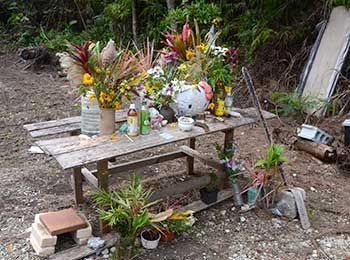Japan determines U.S. contractors are also “employees,” in compensation case for murdered woman

A flower stand installed at the site where the murdered woman’s body was abandoned by an ex-marine. Onna Village, November 2017
March 21, 2018 Ryukyu Shimpo
Tokyo – Regarding the 2016 murder of a woman attached to a U.S. military base, which faces an issue where the U.S. government is refusing to pay damages to the victim’s survivors, Kazuhiro Suzuki, Director-General of the North American Affairs Bureau at the Foreign Ministry, spoke at the Lower House’s Homeland Security Committee, where he commented that in Article 18, Section6 of the Japan-U.S. Status of Forces Agreement (SOFA), an “employee” was defined as not only someone hired by the U.S. government directly to work as a civilian for the military, but, “Is understood to include employees that were indirectly hired.”
Regarding the damages, Minister of Defense Itsunori Onodera explained, “The respective interpretations of SOFA by the Foreign and Defense Ministries are in alignment.”
In the SOFA agreement, compensation for incidents or accidents that happen outside of official business can be demanded as damages from the U.S. government by the victim in cases where the parties cannot come to a resolution, as stipulated in Article 18, Section 6.
The U.S. maintains that this covers, “Members of the U.S. military as well as employees.” They argue that since the defendant in this incident was an employee of a private company but contracted by the military, and thus not a direct hire, that the U.S. cannot be held responsible.
This issue was raised at the Lower House’s Homeland Security Committee by Seiken Akamine (Communist Party), Mikio Shimoji (Nippon Ishin no Kai), by Kantoku Teruya (Social Democratic Party).
Both the Director-General and Minister of Defense expressed their belief that that the “employee” indicated in Article 18 Section 6 included indirect employees in addition to those hired directly by the U.S. government.
Fueling this issue is a deficiency in SOFA wherein the definitions of “civilian personnel” and “employee” are still unclear.
Onodera told the committee that the status of the defendant in this case, “has been acknowledged as civilian personnel under SOFA.”
Last year, the Japanese and U.S. governments signed a supplementary agreement to SOFA that reduces the scope of civilian personnel, however it is not being seen as a path to a full remedy.
(English translation by T&CT and Sam Grieb)
Previous Article:Japan and Taiwan agree to revised fishing regulations in area north of Yaeyama Islands for spring trial period
Next Article:Queen at Sea stops by at Naha port for the third year in a row
[Similar Articles]
- Japan exploring special measures to obtain civil damages from the U.S. in the 2016 murder of an Okinawan woman
- Japan has jurisdiction over the fatal traffic accident caused by a U.S. military civilian employee this January.
- [Editorial]
U.S.-Japan Status of Forces Agreement needs to be revised for cases involving civilian employees of the military “on duty” - Minister of Defense says internal communication delays by U.S. military caused late reporting on dropped Osprey engine intake, no apology from U.S. military
- National Association of Chairmen of Town and Village Assemblies calls for revision of SOFA
 Webcam(Kokusai Street)
Webcam(Kokusai Street)


